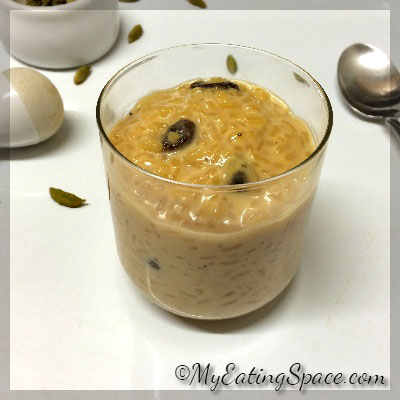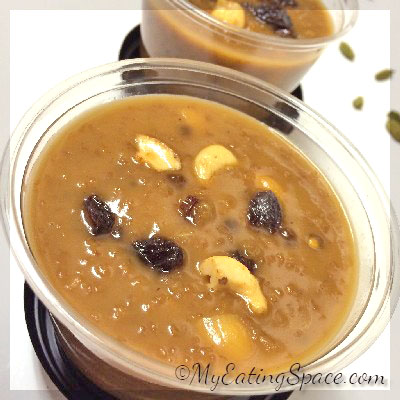
Today’s Karkidakam special is a sweet porridge – Uluva Kanji. Uluva is the Malayalam word for fenugreek. It is called as methi seeds in Hindi. This is a porridge made with rice, coconut and fenugreek as main ingredients.
Fenugreek, whether as seed or green, is one of the most used ancient spice in Indian dishes. The yellowish seeds are small and are slightly bitter. This is great as food as well as medicine. As medicinal food, they are said to help regulate blood cholesterol, blood sugar, in weight loss, reduce menstural discomfort and balancing hormones in women, resolve hair problems and a lot more.
The main reason fenugreek seeds are used during the monsoon season as uluva kanji is they helps in digestion, acid reflux (heartburn) and any stomach ailments. They are rich in soluble fiber, protein and antioxidants which helps to flush out the toxins from the body thus rejuvenating the body. You can enjoy the fenugreek porridge at any time of the year, no doubt. Although, Ayurveda says monsoon (karkidakam) is the best time to have therapeutic dishes and do treatments as the body is vulnerable to many problems during the period.

As it is sweet, it will be easy to make the kids eat the uluva kanji. They can be prepared without jaggery also, a salted porridge.Usually, this porridge is taken continuously for 3 days in karkidakam either as breakfast or dinner. We are making it fresh everyday. So cooking in pressure cooker is the easiest way. Also Ghee is an important ingredient in the karkidaka kanji.
Now let’s make the karkidakam special medicinal fenugreek porridge.
Uluva Kanji / Monsoon Special Fenugreek Porridge/ Marunnu Kanji
Uluva kanji / Fenugreek Porridge
Ingredients
- 1 cup Broken Red Rice
- 5 cups of Water
- 2 tbsp Fenugreek seeds
- 1.5 tsp Cumin seeds
- 1 cup Shredded Coconut
- Salt to taste
- 3/4 cup Jaggery syrup
- Ghee, as required
Instructions
- Soak the fenugreek and cumin seed in 1 cup water overnight or at least 6 hours.
- To the pressure cooker add washed rice, water, soaked fenugreek and cumin seeds along with the water, shredded coconut and salt. Mix well.
- Cover and put on the weight. Cook for 2 whistles on medium height.
- Remove from heat and let it sit until the pressure is released.
- When the pressure is completely released, open the cooker. Add the jaggery syrup (recipe) and mix well to combine.
- Serve the porridge hot in a bowl. Add a tablespoon of ghee into each plate. Mix well to combine. Enjoy the warm medicinal porridge for 3 consecutive days.
Notes
- Usually Navara (njavara) rice is used in making the medicinal porridges. But it is difficult to get this rice in some places. So instead of Navara you can use broken rice, raw white rice or any healthy grain.
- If you don't want the porridge to be sweet, avoid the jaggery syrup. Add enough salt to make it taste good.
- Instead of shredded coconut, you can add coconut milk also.
- You can also make it in a vessel instead of pressure cooker. This will be a little time consuming as you want the rice to be well cooked.
- Ghee is added separately to each plate while serving. You can add more or less ghee as per the taste.
- Always take the porridge hot or at least warm.
- Usually, ashali (garden cress seeds or halim seeds) are also used in the porridge. I haven't used it because I don' have them here.

When the nature pours the monsoon rain on us, let us prepare our body for a better health for the coming year with our medicinal karkidakam special uluva kanji. This porridge is also used in post delivery care for healing in ayurveda and is also considered great for lactation. Usually heavy works are avoided after taking the uluva kanji, so it is better to have it at night for dinner.
Happy Cooking

Similar Recipes
 |
 |
 |
 |
| Caramelized Rice Pudding | Wheat Pudding | Jaggery Coated Plantain Chips |


How much ashali seeds do you add?
Hi Brian,
Ashali seeds have a bitter taste. So add very less seed if you want. My mom makes the recipe with lots of ayurvedic medicines and without jaggery. She cooks all the medicines in water first and store this water for few days. She then cooks the rice and other ingredients in this medicinal water to make the dish during monsoon season.We never liked it at first. But now we can have it easily even without the sweetness of jaggery.